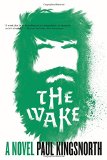Summary | Excerpt | Reviews | Beyond the book | Read-Alikes | Genres & Themes | Author Bio

Andrew Greig's latest book, Fair Helen, is historical fiction set in the Borderlands of Scotland — the no-man's land between that country and England — during the 16th century. Based on a ballad recorded by Sir Walter Scott in the second volume of his The Minstrelsy of the Scottish Border, the tale is one of love, intrigue and violence.
The "Helen" of the book's title is the real-life Helen Irving, who it is said, fell in love with the handsome Adam Fleming, scion of a clan with which her family was feuding (the couple has been referred to as "the Scottish Romeo and Juliet.") She had been promised to Robert Bell, who caught the couple trysting and in anger and jealousy shot at Adam. Helen stepped in front of her lover, blocking the bullet but losing her life in the process. Adam subsequently killed Bell and fled, returning decades later to die on Helen's grave. Their tombs are still at the Kirkconnel churchyard, marked today by a commemorative plaque relaying the tragic story.
Fair Helen begins with Walter Scott's version of the ballad and even though I thought I knew the plot, I quickly fell under the author's spell, and the magic of his writing pulled me into the time and place completely. Greig's lush prose vividly sets the scene, not only depicting the atmosphere of the Borderlands but expertly conveying the history of the time period without making it feel like a historical treatise:
The city was torn into moonlit strips – the dour Castle, the High Kirk where Reform preachers stoked hearts and minds, the dark maw of the Grassmarket and the tenements sliding down the long spine to the palace where Jamie Saxt (but six years our elder) slept uneasily amidst the ghosts of his many murdered regents, his fantasies of sorcerers…On Inchcombe island the abandoned monastery was a black ship with its cargo of souls, going nowhere…In the nearby Auld Kirk of North Berwick the witch trials were proceeding by that most reliable proof: evidence under torture. Some threescore had already been strangled then burned.
While the writing is stellar, perhaps the key to the book's success is its narrator, Harry Langton, whom Grieg invents as Helen's cousin and Adam's friend, somebody who is consequently in a position to witness events as they unfold. As the book opens Harry is an old man near death and feeling that he must record what he knows about the true history of those he loved and lost – and in the process revealing a completely unexpected facet of the story, divulging secrets that make it plain Helen, Adam and Bell were merely pawns in a highly political game. Indeed, although all the elements of the ballad are woven throughout the book, it's truly Harry's story that's central to the plot. He is perhaps the only in-depth character — the one readers come to know – but this works exceptionally well in this framework. The novel becomes about Harry's struggle to walk an increasingly fine line between love and loyalty, with the romance between Adam and Helen decidedly taking a back seat to this far more interesting and original storyline. The end result is a marvelously complex plot rife with moral and political ambiguity.
Although Fair Helen is one of the best historical fiction novels I've read in quite some time, I did find it challenging. First, while there are a few action scenes, most of the novel is contemplative and slow-moving. Much of it is written in a Scottish dialect (a laird has a "big sonsie face,") which slows down the narrative's pace considerably. Finally, there are elements about the historical setting that I found confusing. For example, one of the main characters is Walter Scott – but not the Walter Scott (1771 – 1832) who recorded the ballad referenced in the book's introduction; instead the person featured is an earlier kinsman (1565 – 1611). There are so many Walter Scotts in the family that that only through cross-references and research, was I able to determine which Walter Scott was the subject of the novel. And — I hesitate to admit my denseness here — I was halfway through the book before I realized the man being referred to as Jamie Saxt was in fact King James VI of Scotland. Regardless, I figured out the history and developed an ear for the dialog and the novel has stayed with me for many days after I finished it.
Readers should be aware that in spite of its romantic foundation, Fair Helen isn't a romance. The book will appeal most to historical fiction fans who delight in well-written narrative that centers on historical context and who are less concerned about books with a lot of action or acts of love.
![]() This review was originally published in The BookBrowse Review in January 2016, and has been updated for the
November 2016 edition.
Click here to go to this issue.
This review was originally published in The BookBrowse Review in January 2016, and has been updated for the
November 2016 edition.
Click here to go to this issue.

If you liked Fair Helen, try these:

by Paul Kingsnorth
Published 2015
"A work that is as disturbing as it is empathetic, as beautiful as it is riveting." - Eimear McBride, New Statesman

by Hannah Kent
Published 2014
A brilliant literary debut, inspired by a true story: the final days of a young woman accused of murder in Iceland in 1829.
Your guide toexceptional books
BookBrowse seeks out and recommends the best in contemporary fiction and nonfiction—books that not only engage and entertain but also deepen our understanding of ourselves and the world around us.